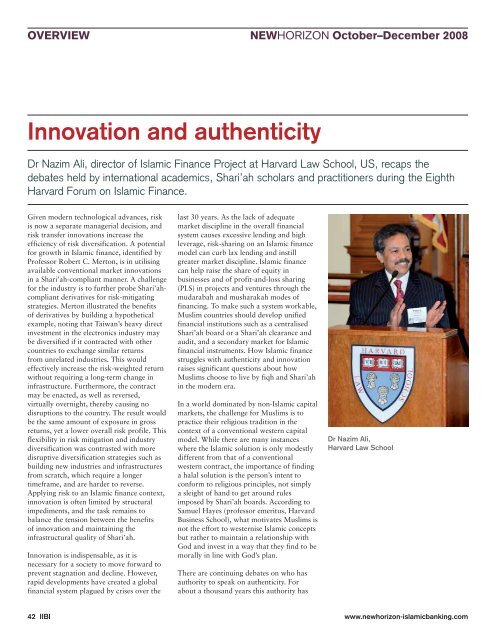azerbaijan: emerging market islamic banking and finance
azerbaijan: emerging market islamic banking and finance
azerbaijan: emerging market islamic banking and finance
You also want an ePaper? Increase the reach of your titles
YUMPU automatically turns print PDFs into web optimized ePapers that Google loves.
OVERVIEW<br />
NEWHORIZON October–December 2008<br />
Innovation <strong>and</strong> authenticity<br />
Dr Nazim Ali, director of Islamic Finance Project at Harvard Law School, US, recaps the<br />
debates held by international academics, Shari’ah scholars <strong>and</strong> practitioners during the Eighth<br />
Harvard Forum on Islamic Finance.<br />
Given modern technological advances, risk<br />
is now a separate managerial decision, <strong>and</strong><br />
risk transfer innovations increase the<br />
efficiency of risk diversification. A potential<br />
for growth in Islamic <strong>finance</strong>, identified by<br />
Professor Robert C. Merton, is in utilising<br />
available conventional <strong>market</strong> innovations<br />
in a Shari’ah-compliant manner. A challenge<br />
for the industry is to further probe Shari’ahcompliant<br />
derivatives for risk-mitigating<br />
strategies. Merton illustrated the benefits<br />
of derivatives by building a hypothetical<br />
example, noting that Taiwan’s heavy direct<br />
investment in the electronics industry may<br />
be diversified if it contracted with other<br />
countries to exchange similar returns<br />
from unrelated industries. This would<br />
effectively increase the risk-weighted return<br />
without requiring a long-term change in<br />
infrastructure. Furthermore, the contract<br />
may be enacted, as well as reversed,<br />
virtually overnight, thereby causing no<br />
disruptions to the country. The result would<br />
be the same amount of exposure in gross<br />
returns, yet a lower overall risk profile. This<br />
flexibility in risk mitigation <strong>and</strong> industry<br />
diversification was contrasted with more<br />
disruptive diversification strategies such as<br />
building new industries <strong>and</strong> infrastructures<br />
from scratch, which require a longer<br />
timeframe, <strong>and</strong> are harder to reverse.<br />
Applying risk to an Islamic <strong>finance</strong> context,<br />
innovation is often limited by structural<br />
impediments, <strong>and</strong> the task remains to<br />
balance the tension between the benefits<br />
of innovation <strong>and</strong> maintaining the<br />
infrastructural quality of Shari’ah.<br />
Innovation is indispensable, as it is<br />
necessary for a society to move forward to<br />
prevent stagnation <strong>and</strong> decline. However,<br />
rapid developments have created a global<br />
financial system plagued by crises over the<br />
last 30 years. As the lack of adequate<br />
<strong>market</strong> discipline in the overall financial<br />
system causes excessive lending <strong>and</strong> high<br />
leverage, risk-sharing on an Islamic <strong>finance</strong><br />
model can curb lax lending <strong>and</strong> instill<br />
greater <strong>market</strong> discipline. Islamic <strong>finance</strong><br />
can help raise the share of equity in<br />
businesses <strong>and</strong> of profit-<strong>and</strong>-loss sharing<br />
(PLS) in projects <strong>and</strong> ventures through the<br />
mudarabah <strong>and</strong> musharakah modes of<br />
financing. To make such a system workable,<br />
Muslim countries should develop unified<br />
financial institutions such as a centralised<br />
Shari’ah board or a Shari’ah clearance <strong>and</strong><br />
audit, <strong>and</strong> a secondary <strong>market</strong> for Islamic<br />
financial instruments. How Islamic <strong>finance</strong><br />
struggles with authenticity <strong>and</strong> innovation<br />
raises significant questions about how<br />
Muslims choose to live by fiqh <strong>and</strong> Shari’ah<br />
in the modern era.<br />
In a world dominated by non-Islamic capital<br />
<strong>market</strong>s, the challenge for Muslims is to<br />
practice their religious tradition in the<br />
context of a conventional western capital<br />
model. While there are many instances<br />
where the Islamic solution is only modestly<br />
different from that of a conventional<br />
western contract, the importance of finding<br />
a halal solution is the person’s intent to<br />
conform to religious principles, not simply<br />
a sleight of h<strong>and</strong> to get around rules<br />
imposed by Shari’ah boards. According to<br />
Samuel Hayes (professor emeritus, Harvard<br />
Business School), what motivates Muslims is<br />
not the effort to westernise Islamic concepts<br />
but rather to maintain a relationship with<br />
God <strong>and</strong> invest in a way that they find to be<br />
morally in line with God’s plan.<br />
There are continuing debates on who has<br />
authority to speak on authenticity. For<br />
about a thous<strong>and</strong> years this authority has<br />
Dr Nazim Ali,<br />
Harvard Law School<br />
42 IIBI www.newhorizon-<strong>islamic</strong><strong>banking</strong>.com
















